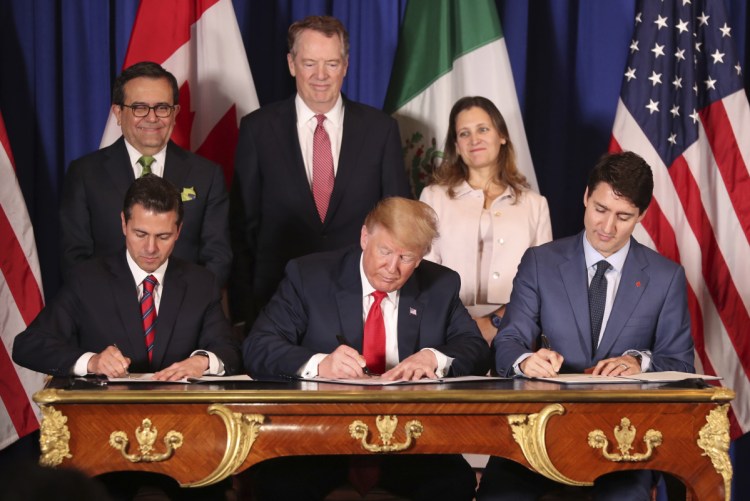Maine retailers that ship products to Canada could see a sales boost under a new North American free trade deal.
The United States-Mexico-Canada Agreement, the proposed successor to NAFTA, would allow the first $150 (Canadian) of goods bought in the U.S. and shipped to Canada to be duty-free. It also exempts the first $40 from Canadian sales tax.
The current duty-free threshold is only $20 (Canadian), or about $15 (U.S.).
President Trump, Mexican President Enrique Peña Nieto and Canadian Prime Minister Justin Trudeau signed the pact Friday during the G-20 conference in Argentina. The deal, a replacement of the 24-year-old North American Free Trade Agreement, still has to be ratified by the three countries before it takes effect.
“The announced increase in the threshold for duty-free shipments will make our products that much more accessible to our Canadian customers,” said L.L. Bean spokeswoman Carolyn Beem.
The Freeport retailer has been shipping products to Canada for decades and recently launched a dedicated Canadian website with pricing in Canadian dollars and a duties calculator. The company has also partnered with a wholesaler to sell L.L. Bean products at Canadian retailers.
“We have a natural connection with our Canadian customers in both proximity and climate, and we share a love of the outdoors,” Beem said. “Overall we see this as positive for our Canadian business.”
Aside from the benefit to consumers north of the border, the new trade agreement may only have marginal benefits to Maine.
The deal mostly leaves NAFTA in place, but does help the U.S. auto industry by requiring that 40 percent of vehicles be made where workers make at least $16 an hour. The U.S. dairy industry would get more access to the protected Canadian market, and there are new rules for companies in the digital economy.
“It changes things for places creating a lot of digital content or that have a large auto industry,” said Wade Merritt, president of the Maine International Trade Center. “Although we do have some of that here, it is not massive by any stretch, like it would be in other parts of the country.”
Maine exported $1.2 billion worth of products to Canada in 2017, 45 percent of its entire exports, according to the trade center. Lobster, wood products, paper and aircraft parts were some of the top exports, some by Canadian companies operating in Maine, Merritt said.
The new deal does not address persistent trade issues for Maine companies such as tariffs on Canadian softwood and aluminum and steel put in place by the Trump administration. Maine companies mostly dodged Canadian tariffs imposed this summer in retaliation for the steel and aluminum taxes.
“That is obviously disappointing for us, because these are two issues we’d like addressed,” Merritt said.
Maine’s dairy industry could benefit from more market access in Canada, even though it will not be shipping milk across the border directly, said Julie Marie Bickford, from the Maine Dairy Industry Association.
“What we hope happens is it opens up new international markets for U.S. dairy, and it will help drive up prices for farmers who desperately need higher prices right now,” she said.
Even though the deal is signed, it still needs to be ratified by Congress and the governments in Canada and Mexico. The timeline for when that might happen is uncertain, but it may not happen until sometime in 2019.
Asked whether they would vote to ratify the deal, Maine Sens. Susan Collins, a Republican, and Angus King, an independent, said in a joint statement they would continue to review the deal and talk to Mainers to see if it benefits the state and its small businesses.
“In addition, we urge the administration to turn its full attention to other trade issues that are harming our state, including the retaliatory tariffs China has levied on Maine lobster and import taxes on steel that have significantly increased costs for manufacturers,” the senators said.
Send questions/comments to the editors.



